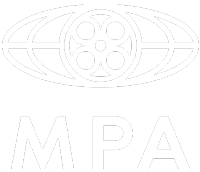Safeguarding
Creativity
The power of storytelling is limitless, transporting us to new worlds, introducing us to fresh perspectives, and powering narratives that challenge our thinking. When free to imagine and invent, the creative minds behind film and television captivate audiences worldwide and inspire the next generation of creators.
At the MPA, we’re committed to protecting the fundamental rights of creators—and bolstering the policies that protect them—so that our industry can continue to ignite the passions of fans everywhere.
Supporting Creators by Defending Copyright
Copyright is the foundation of our nation’s creative economy and a bedrock principle that supports the livelihoods of millions of American creators. Today, the U.S. core copyright industries adds more than $1.2 trillion to the national economy and support more than 5.5 million direct jobs.
The Constitution’s Copyright Clause (Article I, Section 8, Clause 8) grants Congress the authority to “promote the progress of science and useful arts, by securing for limited times to authors and inventors the exclusive right to their respective writings and discoveries.”
The Copyright Act recognize creators’ exclusive rights in their creative works, and serves as a guidepost for much of what we do at the MPA.
U.S. public policy must support a robust copyright framework that protects the rights of creators to produce their works, provides opportunities to enter into contracts for its distribution, and appropriately addresses piracy and other violations of the law that cause creators harm. We must uphold America’s existing copyright laws and resist efforts by those who seek to erode copyright to the detriment of the creative economy.
Creators around the world deserve the same supportive policies to allow them to thrive. In trade agreements and before governments around the world, the MPA advocates for improvements in international copyright law and strong intellectual property protections.
Defending Free Speech
There is no better embodiment of the American spirit than the Constitution’s First Amendment, which establishes—among a number of other important things—the fundamental right to speak and communicate freely.
Free speech and free expression unencumbered by government interference or unfounded private legal action empowers our creative community to not only entertain, but to inform, challenge, and inspire.
Throughout its history, the film and television community has been a leading voice for free speech and expression. The MPA takes pride in our longstanding and continued commitment to the First Amendment—and has consistently resisted calls for government censorship. By establishing the voluntary movie rating system, fighting for free speech in the courts and legislatures, and ensuring creators have the opportunity to bring their vision to life, we seek to guarantee that all forms of storytelling are protected and empowered.
In 1953, Superior Films, Inc. sued the Ohio Board of Education for censorship and violating the studio’s first amendment rights to free speech after the state blocked the use of adult material in one of its films. Superior Films, Inc. lost the case in the Ohio State Supreme Court.




The studio appealed to the Supreme Court
…and their case was heard the following year. The MPA supported Superior Films, Inc. submitting a statement which argued that Ohio’s Governmental Film Office efforts had effectively censored content produced by the studio in a manner that was "repugnant to the first amendment."
The U.S. Supreme Court overturned
…the Ohio State Supreme Court’s sentence in a unanimous decision, supporting the right for creators to utilize free speech. And few years later in 1968, a national film rating system, the Classification & Ratings Administration (CARA), was developed to provide parents with information to help them determine what level of content is appropriate for their children.


Content Protection
Thanks to advances in technology, audiences have more choices than ever before to access content—where, when, and on any device they want. However, as content increasingly moves online, piracy remains a threat. There were an estimated 159.6 billion visits to film and TV piracy sites globally in 2021. One out of four content theft sites exposed consumers to malicious content.
There were an estimated 159.6 billion visits to film and TV piracy sites globally in 2021.
Our industry’s comprehensive approach to protecting both creators and audiences includes the ongoing expansion of legally available content, enforcement actions, and voluntary initiatives with responsible companies in the internet economy.
To reduce piracy, the Copyright Act provides both civil and criminal enforcement mechanisms. The MPA supports continued funding for our nation’s law enforcement agencies to advance these measures and curtail the theft of creative works.
The MPA also supports the work of global initiatives, such as the Alliance for Creativity and Entertainment (ACE)—a coalition of more than 50 leading media and entertainment companies—that is committed to protecting creativity and reducing piracy. While not itself a member of ACE, the MPA is instrumental to its success, lending its content protection resources, research, and expertise to ACE members.
While copyright laws vary from country to country, a set of international agreements helps to protect creators and makers’ intellectual property rights across the globe. The MPA works hard to protect creators worldwide, using lists like the annual Special 301 report and the Notorious Markets List to identify trouble areas and improve enforcement and market access among our trading partners.

